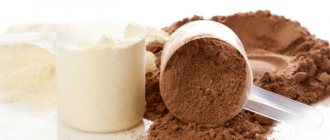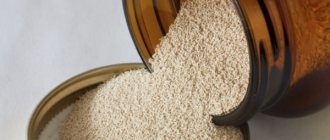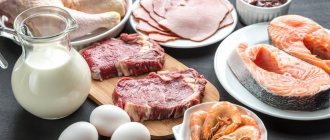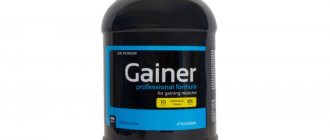Why does an athlete need carbohydrates?
Why is this perhaps the most demonized macronutrient in the sports environment so important? Aren't carbohydrates a source of excess calories and excess fat?
The truth is, no. These saccharides play a much more important role than it might seem at first glance. Let's find out why they are so necessary in bodybuilding.
Gives you energy to workout
In fact, carbohydrates deserve much more attention than we are used to giving them. Firstly, they are the main source of energy for our body. Even if our diet is full of fats and proteins, they are not able to charge us the way carbohydrates do.
Reducing their number is not suitable for those athletes who actively train and want to build a large amount of lean muscle mass. All this is because intense strength training for muscle hypertrophy requires a significant expenditure of energy, which this diet simply cannot provide, because it does not contain carbohydrates!
In addition, a low-carb diet leaves your body deficient in sugars, so during a workout you may feel exhausted after the first set. Provide your muscles with enough glycogen and you'll be fine again.
Thus, by charging you with energy, carbohydrates give you more strength to train, thanks to which your muscles increase. It is logical to assume that if you are energetic and full of strength, then you will be able to work out much harder. The harder the workout, the more microcellular damage occurs. And the more such damage to muscle fibers occurs, the greater the potential for their further growth (of course, subject to proper recovery).
Carbohydrates and proteins interact with each other
Protein synthesis is a process that results in the creation of new protein in the cells of our body. The process of protein synthesis occurs along with the process of protein degradation, that is, the decomposition of protein cells.
Proteins are used by our body to repair and strengthen damaged muscles. If protein synthesis is insufficient, then your muscle fibers damaged by training cannot be repaired, which will ultimately lead to loss of lean muscle mass.
The vast majority of scientists agree that eating after exercise stimulates protein synthesis. Does this mean you should knock over your protein shake before the thrown dumbbells even hit the floor? Of course not.
It is optimal to eat a high protein meal within two hours after training.
! Forget about the 30-minute anabolic window! This ploy is just a marketing ploy and nothing more.
There is now research that shows that carbohydrates actually stimulate protein synthesis. This is one of the reasons why fast carbohydrates should be included in the “post-workout” meal.
“Obviously, this is due to the fact that when carbohydrates are detected in the body, insulin production is stimulated in the body. This process helps supply the muscles with amino acids, which speed up protein regeneration.”
When it comes to carbohydrates, the sooner your body can get them, the better. So, if you can, try having a lighter post-workout snack with a lower glycemic index.
Retains protein in the body
Another great thing about carbohydrates is that they help the body get energy from sources other than protein. Therefore, foods containing carbohydrates can be not only tasty, but also healthy.
Remember what we said about them being a great source of energy? So, when you provide your body with enough carbohydrates, two things happen. First, if you're just about to get a good workout in, your blood sugar will be used as fuel by your body during the training session.
Not training? Well, then the carbohydrates will be stored in your muscles and liver as glycogen stores. And when you decide to exercise, say, an hour or two after eating, your body will convert glycogen back into glucose, which will again act as a source of energy.
But what do you do if you haven't refueled with carbohydrates?
If your tank doesn't have enough fuel in the form of fats or carbohydrates, your body will begin to take energy directly from muscle tissue. Which is especially bad if your goal is to gain weight.
If your diet is rich in protein foods, then this will undoubtedly provide the body with the necessary energy. However, the remaining protein will clearly not be enough for muscle growth.
! Moreover, the problem of energy deficiency does not lose its relevance even after you have completed your workout. After strenuous exercise, your body's glycogen and fat stores are low, but your body still needs energy to recover. And where will it get it from? That's right, from your muscles earned by sweat and blood.
So how to solve this problem? Consume more carbohydrates!
Accelerates recovery after training
As you know, the key to gaining muscle is the period of rest and recovery.
After finishing your workout, your body is more hungry than ever to replenish its glycogen stores. Scientists believe that the faster you replenish your carbohydrate reserves, the better it will be for your body.
We have already mentioned that carbohydrates have a positive effect on muscle building. They can help improve protein synthesis, which helps your muscles grow better and become stronger.
However, carbohydrates are useful not only for muscle growth, but also for their recovery.
Can prevent colds
Research shows that complex carbohydrates help strengthen the immune system.
Intense exercise is known to increase the risk of illnesses such as colds and flu. Simply put, vigorous exercise suppresses your immune system, making you more susceptible to illness, especially during recovery.
Scientists have found that carbohydrates can prevent colds. This appears to be because they alleviate exercise-induced immunosuppression.
To build muscle mass, you need to exercise regularly. Thus, while protecting you from colds, carbohydrates help you increase muscle size, albeit indirectly.
Additionally, studies have shown that carbohydrate intake is directly related to sleep quality
! Sleep is the most important recovery period for an athlete. During such rest, your muscles recover and grow fastest. In addition, the body releases the most growth hormone during sleep.
Healthy sleep also affects your testosterone levels, which directly affects muscle growth.
Poor sleep can lead to low testosterone levels, even if you are in your prime. Over time, chronic lack of sleep will seriously impact your body's ability to gain weight.
So how do carbohydrates affect sleep?
First, they help you fall asleep. This means that you will reach the most optimal state of rest much faster. That is, the faster you fall asleep, the faster you start the process of anabolism, due to which your muscles grow.
Secondly, carbohydrates can improve sleep quality. Research has found a link between a high-carbohydrate diet in men and improved quality of REM sleep, which leaves you feeling more refreshed and rested.
Thus, good and quality sleep not only promotes muscle growth and testosterone production, but also energizes you. What else, if not vigor, is so important for effective training?
How “proper” carbohydrates work
Once in the body with food, they are absorbed into the walls of the gastrointestinal tract and slowly raise blood sugar levels. There are no glucose surges in the body, the person’s mood and condition remain stable and even. In general, don’t want to be considered a nervous and fussy person? Adjust your diet towards the healthiest “slow” carbohydrates.
It is noteworthy that a person starts digesting this type of carbohydrate from the first piece of product that enters the mouth. This is facilitated by a special enzyme produced by human saliva. Therefore, no to stress, yes to weight loss and peace!
When do you need to eat carbohydrates to grow muscles?
To recover AFTER a workout, you need to eat something containing carbohydrates within an hour or two after finishing it. Smaller forms of glucose, such as gels, dextrose or table sugar, can be consumed almost immediately after a training session.
Products containing fast carbohydrates like white rice are not only easier to digest in the digestive tract, but also have a higher glycemic index. By consuming such foods after a workout, you will absorb them faster, which means you will be able to replenish your glycogen stores faster. This energy contribution will help your body recover and become even stronger.
Well, if you want to eat BEFORE training, then nutritionists recommend eating foods containing slow carbohydrates. Eating brown rice, sweet potatoes, or oatmeal two hours before your workout will provide you with a steady supply of energy throughout your workout session.
Try not to eat less than two hours before starting your workout. Your body will already be too busy, so why strain it even more?
But what if you need a quick recharge?
This is where foods with a high glycemic index come to the rescue. Sports drinks, energy bars and gels will quickly and easily provide your body with the energy it needs.
Certain fruits, such as pineapple, are another way to get your carbohydrate intake. Snack on pineapple, dates, apples or bananas half an hour before heading to the gym and you'll be energized to get through your hard-hitting workout!
! Just remember that simple sugars are absorbed faster, and complex carbohydrates slower. Therefore, before starting your workout, calculate the optimal time to eat.
What are fast carbohydrates
Fast or simple carbohydrates include all the sugar and starch consumed in food. They are easily broken down and absorbed by the body thanks to a special chemical formula, dissolve in water and have a pronounced sweet taste. These carbohydrates include monosaccharides and disaccharides.
Monosaccharides include substances:
- Glucose. Glucose-containing foods - carrots, grapes, corn, berries. It is stored in the liver and muscles as energy reserves in the form of glycogen.
- Fructose. Natural sources of fructose are honey, ripe fruits and vegetables. It is absorbed a little worse, since the body must process it into glucose.
- Galactose is contained in dairy products.
The following components are classified as disaccharides:
- Lactose. It is an animal carbohydrate found in milk.
- Maltose is a sugar obtained after the fermentation of grapes and the formation of malt. Contained in oranges and beer.
- Sucrose. Natural sources - cane, beet, brown sugar, black molasses; sucrose is present in smaller amounts in vegetables and fruits.
The division of carbohydrates into fast and slow is associated with the glycemic index.
Why are carbohydrates so important for gaining muscle mass?
Foods high in carbohydrates do not have a very good reputation in the modern world. Over and over again they try to convince men that such products lead to obesity, and in general that they are harmful to health. But is this really so?
The importance of this macronutrient in the proper nutrition of athletes cannot be underestimated, especially when it comes to building muscle mass at home.
Carbohydrates are a kind of fuel that provides our body with the energy it needs to work. Of course, even on a low-carbohydrate diet, our body will be able to obtain energy, for example, by burning fat or protein. However, in terms of energy value, nothing compares to carbohydrates.
We recommend reading: how to gain muscle mass for a girl.
By providing your muscles with enough glycogen, you can significantly increase the amount of work you do, which in turn will significantly accelerate the growth of your muscles.
Carbohydrates affect muscle growth not only directly, but also indirectly. They stimulate protein synthesis, which plays a key role in the process of muscle growth.
Additionally, studies have shown that carbohydrates improve sleep quality. So feel free to eat a piece of crispy whole grain toast before you go to bed and your muscles will thank you. Good sleep is the key to muscle growth.
Why do we need carbohydrates?
Carbohydrates (glycides) are organic compounds of carbon (carbonyl group) and water (hydroxyl group). In our body they are the main source of energy. It is produced from sugars (sucrose, lactose, glucose, maltose), starch, dietary fiber (pectin, cellulose, etc., found only in plants) and sugar alcohols.
Let's consider what functions these organic compounds perform in the human body:
- They are part of cells and tissues.
- Provides the body with energy.
- They are part of antibodies and perform a protective function.
- Blood type is determined.
- They are a reserve nutrient in the body (glycogen or animal starch).
- They protect the walls of hollow organs (esophagus, intestines, stomach, bronchi) from mechanical damage and the penetration of harmful bacteria and viruses.
- Glucose, galactose and other sugars are part of blood plasma glycoproteins, as well as glycoproteins and glycolipids. These substances play an important role in the receptor function of cell membranes.
Insufficient amounts of glycides in the body can negatively affect human health. Some signs that your body is lacking these substances may include:
- frequent feeling of hunger;
- nausea;
- profuse sweating;
- trembling in hands;
- drowsiness;
- causeless weight loss;
- general weakness in the body;
- dizziness;
- headache.
If you notice these symptoms, you should consult your doctor and, if necessary, choose a special diet that will increase the amount of sugars in your food.
List of foods rich in carbohydrates
Are you afraid of carbohydrates like fire? Believe me, it's not worth it! In fact, they can be extremely beneficial, especially for athletes. This macronutrient is essential if you want to achieve high athletic performance and gain muscle mass. It doesn't matter if you're a bodybuilder, a runner, or an MMA fighter, carbohydrates are your friend.
Below you will learn about 6 carbohydrate-containing foods that must be present in the diet of every athlete.
Bananas
Bananas are one of the most consumed fruits all over the world. These yellow beauties contain a lot of carbohydrates, which are the main source of energy for your body. In addition, bananas are rich in fiber and contain antioxidants.
One medium-sized banana contains about 33% of the recommended dietary allowance for vitamin B6, 11% vitamin C, 8% magnesium, 14% manganese, as well as many other beneficial vitamins and minerals such as vitamin B4, potassium and copper.
According to studies, bananas can prevent cramps and inflammation during physical activity. Thus, this miracle fruit not only fuels your muscles but also helps protect them from damage.
Our advice is to eat one banana before training and one after. By following this recommendation, you will provide your body with the necessary level of energy for training, and help it recover after training.
Oatmeal
Oatmeal is one of the healthiest foods on a bodybuilder's table. In addition to being an excellent source of slow carbohydrates, oatmeal is rich in protein, fiber, vitamins, minerals and antioxidants. And it's also incredibly delicious!
Each grain of oatmeal is filled with zinc, iron, magnesium, phosphorus and vitamin B1. All these microelements activate recovery processes in the body, improve muscle function, and even promote the production of testosterone.
Oatmeal is also a good source of protein. Nutritionists say it stands out from most breakfast cereals due to its significantly higher amino acid content. It turns out that whole grain oatmeal is an ideal breakfast for athletes who want to build muscle size.
But if this porridge contains a lot of carbohydrates, will it cause you to gain weight? Not really. The thing is that beta-glucans, which are found in abundance in oats, stop a sharp rise in sugar and slow down the rise in insulin levels in the blood, and also slow down their subsequent decline.
Also, oat beta-glucans “attract” water and the eaten porridge increases slightly in size, which gives you a feeling of fullness faster. Moreover, these substances increase the viscosity of food, causing the digestion process to slow down, allowing for better absorption of nutrients.
Quinoa
If anything deserves the title of super food, it's quinoa!
Quinoa seeds are completely gluten-free, loaded with vitamins, and rich in protein. Moreover, among plant sources of essential amino acids, quinoa is the only one containing all 9!
One full cup of this plant's seeds contains almost 80 grams of protein. But most importantly, quinoa is an excellent source of lysine. This amino acid is extremely necessary for athletes, because it is important for building muscle mass.
According to research, lysine also protects your bones by improving the absorption and retention of calcium in the body, which prevents injury during strenuous exercise.
Plus, by eating just one serving of quinoa, you'll get 58% of your daily value for manganese, 30% of magnesium, and 13% of zinc.
Quinoa has been shown to stimulate muscle growth and improve muscle function, as well as have anti-inflammatory properties. Quinoa is also rich in iron. This important trace element will help you save and accumulate energy for subsequent training.
Blueberry
In pursuit of “large” sources of carbohydrates, one should not forget about berries. Did you know that berries are some of the most nutritious foods on the planet? It’s not for nothing that they’re called “tiny power plants.”
One cup of blueberries contains about 4 grams of fiber. They also provide 24% of the recommended dietary allowance for vitamin C and 36% of vitamin K. Blueberries are also rich in manganese, an important mineral that is essential for maintaining healthy bones.
Research shows that blueberries speed up muscle recovery after strenuous workouts. This is due to the fact that this berry has powerful anti-inflammatory and antioxidant properties. It is worth noting that blueberries are the champion in antioxidant content among other foods. And any athlete knows that the better the recovery, the better the muscles grow.
What other beneficial properties can this berry offer athletes? In addition to being extremely beneficial for overall health, blueberries also stimulate brain function. “Charged” brains mean quick reactions, lightning-fast decision-making and good memory, which, you see, is important for training in the gym.
Yam or sweet potato
Sweet potatoes are a favorite among bodybuilding enthusiasts and have become a fitness diet staple. There are many varieties of sweet potatoes, such as pink, purple or white, but in this article we will look at the orange-fleshed sweet potato variety.
According to scientists, orange sweet potatoes are an excellent source of energy, rich in vitamins, minerals and contain a lot of fiber.
200 grams of sweet potatoes contain about 796% of the daily requirement of vitamin A! By adding sweet potatoes to your diet, you'll also get 65% of your daily recommended intake of vitamin C, 50% of manganese, 29% of vitamin B6 and 27% of potassium. Impressive, isn't it?
Like many other foods on this list, sweet potatoes are a rich source of antioxidants, which reduce the harmful effects of free radicals produced during intense exercise. Therefore, by consuming foods high in antioxidants, you provide your body with better recovery between workouts.
It's interesting, but few people know that sweet potatoes also have a positive effect on your immune system. Orange-fleshed sweet potatoes are rich in beta-carotene and are converted into vitamin A in the body.
Research has found a link between low vitamin A levels and poor immunity. Therefore, adding sweet potatoes to your diet will help you avoid various diseases. Benefit for athletes? Less time at home spent sick on the couch, more time healthy in the gym!
Beet
This burgundy root vegetable is a real storehouse of useful elements that no athlete can do without.
First of all, beets are very nutritious. One such fruit contains a lot of vitamin B6, magnesium, potassium, phosphorus and vitamin B9, better known as “folic acid”. In addition, beets are a good source of fiber, which we know is extremely beneficial for proper digestion.
In addition to all of the above, this vegetable is also interesting because it can improve your productivity. The thing is that beets contain nitrates, which stimulate the use of mitochondria - the organelles that are responsible for producing energy in your cells. Therefore, thanks to beets, your athletic performance can improve significantly.
Beetroot juice not only has a positive effect on the cardiovascular and respiratory systems, but also enhances muscle function. It has been proven that beets help athletes stay in action much longer and delay the moment of physical exhaustion.
Slow carbohydrates: where to get them from
So what foods should you choose to get the daily amount of slow carbohydrates that your body requires?
- flour: coconut (GI = 35), whole grain wheat and spelled (GI = 45)
- pasta, cereals, legumes: buckwheat and oatmeal (GI=40), brown rice (GI=45), durum wheat pasta (GI=50), chickpeas (GI=30), beans (GI=42)
- fruits: green apples and green bananas (GI=30), grapefruit and apricots (GI=20), plums and cherries (GI=22), pears (GI=34), strawberries (GI=32), grapes (GI=40 ), oranges (GI=35)
- bread: whole grain flour (GI=35), gray wholemeal bread (GI=40), rye bread (GI=30)
- To slow carbohydrates, you can add some vegetables, salads, herbs and mushrooms to the food list: lettuce, lettuce, tomatoes, onions, cabbage, broccoli, eggplant, garlic, mushrooms, green peppers - all with the same GI = 10, carrots (GI = 35)
- nuts and sweets: berry marmalade without sugar (GI=30), dark chocolate 70% (GI=22), peanuts (GI=20), walnuts (GI=15)
- dairy products: plain or low-fat yogurt (GI=35), 2.7% milk or soy milk (GI=30)
As can be seen from the above list, there are enough food products containing slow carbohydrates so that you can choose to your liking. How many of these carbohydrates you personally need per day depends on what goal you are striving for - gaining weight or losing excess weight. We can definitely say that in both cases you can’t do without complex carbohydrates.
Don't miss interesting news and events in the telegram channel: https://tlgg.ru/fitbarnews
Eating carbohydrates: rules and recommendations
In fact, there are no strict rules for eating carbohydrates. However, if you want to get as much benefit from this macronutrient as possible, then you should be guided by these simple principles:
- calculate for yourself the amount of macronutrients that you need to consume every day;
- count calories daily;
- using a special application or formula, find out your daily requirement;
- be careful about what foods you consume and when;
- additional sugar can be obtained from dried fruits;
- Please note that low-fat products may also contain sugar;
- Remember that 1 gram of carbohydrates equals 4 kilocalories.
How many carbohydrates do you need to gain weight?
To optimize muscle growth, you need to eat in a slight excess of calories (called a "surplus"). This means that the level of energy received from food should be higher than you spent during the day. The excess should be about 200 calories, but this number can be adjusted individually depending on your individual characteristics and desired results.
So, in order to ensure stable muscle growth, you need to consume 1.6-2.2 g of protein per 1 kg of body weight. The rest of your body's caloric needs will come from fats and carbohydrates. However, make sure that their content is not too low. Too little fat in your diet can be detrimental to your health, and too little carbohydrate can impair your performance in the gym.
Calculate your daily requirement
Why is carb counting so important? Judge for yourself: if you don't consume enough calories to provide your body with the energy it needs to train, you simply won't be able to build as much muscle, and the time you spend in the gym will be wasted.
If your diet contains too many carbohydrates (read: calories), then you will gain more fat tissue than you would like. To lose excess weight, you will have to go on a diet. Therefore, you will spend even more time to get the body of your dreams.
Calculating your daily intake will only take you a couple of minutes, but it will save you weeks or even months of merciless training!
If you do strength training, eat more carbohydrates
Intense exercise, such as heavy weight training, uses up almost all of your carbohydrate reserves because the body needs a lot of energy to perform such activities.
The less energy in the body, the faster it gets tired, and the faster your strength runs out. Of course, you can build muscle without eating carbohydrates. However, you are likely to gain much more muscle in a much shorter period of time if you eat enough carbohydrates in your diet.
Most bodybuilders consume about 2-6 grams of carbohydrates per 1 kg of their body weight. But it's worth considering that your personal needs will depend on how often you exercise. The more frequent your workouts, the more carbohydrates you need, and vice versa.
Formula for calculating the daily norm of BZHU for muscle growth
- Set the total number of calories you need to gain weight.
- Set the required ratio of protein and fat in your diet.
- Add up the number of calories you get from protein and fat. Then subtract this value from your total daily calorie intake.
- Convert the resulting amount of calories into carbohydrates (1 gram contains 4 kcal).
- Adjust their amount to provide your body with energy during strength training.
Remember that the more often and more you exercise, the more energy your body needs.
If you need to increase your carbohydrate intake, instead of changing the protein content of your diet, reduce your fat intake.
Your best friend and GF assistant
If your goal is to gain weight, then in this task your best friend and assistant will be ]Grow Food[/anchor], which especially for you has developed a POWER menu complex for effective muscle gain.
You don’t have to create tables and meal schedules yourself, calculate calories, eat food, endlessly weigh your food, and ensure that your food is varied. GF nutritionists and chefs have already done all this for you.
The variety will be especially striking. You will eat five times a day, and for a whole week, not a single dish will be repeated. Our professional nutritionists very carefully calculated the BJU when gaining weight for each of the dishes. The result is a delicious, healthy and beautiful menu that meets your requirements.
On average, the daily diet adds 2500 kcal. By ordering a diet from GF, you will receive a balanced, proper meal five times a day, with a varied menu, excellently tasty and aesthetically appetizing dishes.
Our chefs prepare dishes for you every day from fresh, high-quality products, avoiding harmful substances such as gluten, palm oil, thickeners, etc. It is impossible to underestimate the importance of nutrition in the daily life of both the average person and the athlete. Therefore, our clients are both professional, performing athletes and people who lead a healthy lifestyle to keep their body in shape.










